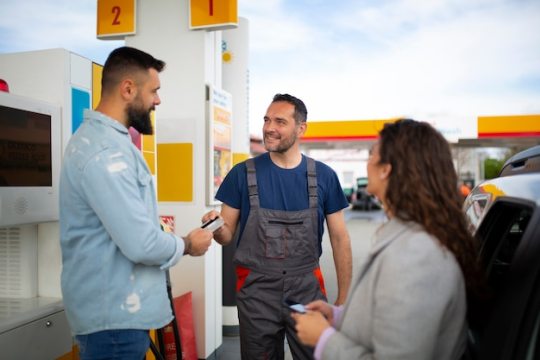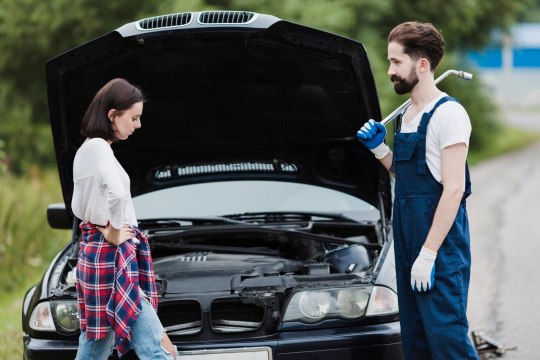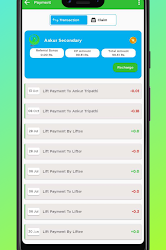Don't wanna be here? Send us removal request.
Text
How Apps Are Revolutionizing Lift Sharing: A Look at Char Pair and Similar Services
Right from the ancient age offering and finding lifts have been seen absolutely normally. But as the newspapers reflected the distressed and unsafe environment, the normalised perception of lifts was pushed into an endangering position. But who knew, that by today we would be witnessing a beautiful blend of technology, convenience and security together, revamping the idea of finding and offering lifts.
In recent years, technology has fundamentally transformed various aspects of our daily lives, and transportation is no exception. Offer and find lift apps, like Char Pair, are leading this change by offering a modern, efficient alternative to traditional transportation methods. This blog delves into how these apps are revolutionizing the way we travel, saving money, and benefiting the environment.
The Rise of Lift-Sharing Apps
Carpooling apps are the in-built solution to the inefficiency of owning personal cars, the inefficiency of public transport, and just about everything else. These platforms will pair drivers and passengers travelling to the same destination or close by so that they can share the journey and costs incurred. This innovation is not only about convenience but making travel cheap, sustainable, and socially engaging.
Char Pair would probably be one of the best examples of how such apps are making a difference. Facilitating car sharing, Char Pair enables its users to find or offer lift. This share can drastically cut down on travel expenses and the impact on the environment. This is a process where drivers offer extra seats in their vehicle to passengers who want to travel to the same destination or a route quite similar.
Economic Benefits: Saving on Fuel Costs
One of the most immediate benefits of using lift-sharing apps is the potential to save on fuel costs. The cost of petrol and diesel can fluctuate dramatically, placing a significant financial burden on regular commuters. By sharing rides, users can divide the cost of fuel, making travel more affordable.
For instance, a long-distance journey that is going to cost a small fortune in petrol or diesel expenses is split among several passengers. Not only does it make the journey more economical, but it also less burdensome for individual drivers.
Moreover, diesel might be costlier than petrol; hence, the overall travel expense will also depend on it. In either case, the facility of ride-sharing apps is equally useful in sharing the cost and hence the load on one's pocket, independent of which fuel type is used. In this way, it allows users to be more flexible while budgeting.
Environmental Impact: Saving the Environment
Besides the direct positive externalities on the pocket, lift-sharing apps have an auxiliary role in saving the environment. By reducing the number of ride-sharing automobiles, emissions and traffic congestion are minimized. This is a pivotal factor in attaining sustainable urban mobility.
Apps for lift-sharing cut down the number of cars which would otherwise be taken out for daily commutes; that means a contribution toward decreased levels of air pollution and fewer emissions of greenhouse gasses, especially in urban places. As such, the reduction of petrol and diesel consumption conserves natural resources, albeit factored into the total, collective decrease.
Practical Benefits: Lift Offered and Lift Wanted
These apps have fast-tracked the whole process of looking for a lift. Users only have to key in details of where they are going to be matched with drivers who are moving in the same direction. No more hard planning or looking around for transportation ways.
In stark contrast, providing a ride is just as effortless. Users can post available seats, indicate what route they are travelling, and then simply let others book those seats. This serves to do much more than just optimize vehicle utilization; it puts people together with similar mobility needs and thus produces some kind of "user community.".
With its user-friendly interface, Char Pair has enabled drivers and passengers to start making arrangements for travel in a very simplified form. As a result, more people have been invited to participate in fuel sharing, which, in essence, benefits not only people but also the environment.
Vehicle Maintenance: Keeping Your Vehicle in Top Shape
Another aspect of fuel-sharing and lift-sharing apps is their indirect impact on vehicle maintenance. It would appear that if cars are used more efficiently, for example by car sharing, they need servicing less often than when driven singly.
To get the best performance and fuel efficiency from one's vehicle, proper vehicle maintenance is key. Fewer vehicle trips allow drivers to spread out some of the maintenance checks over a longer time, thus reducing overall vehicle upkeep costs. This is because the vehicle, when not used for individual high-frequency trips, suffers less wear and tear.
Conclusion
In conclusion, lift-sharing apps like Char Pair are revolutionizing transportation by providing a more cost-effective, environmentally friendly alternative to traditional travel methods. By facilitating fuel sharing, these apps help users manage their fuel costs, whether for petrol or diesel and reduce their overall transportation expenses.
These benefits also extend to personal savings and contribute toward broader environmental goals. By making it easy to save the environment in terms of reduced emissions and reduced fuel consumption, these apps contribute a little toward global sustainability campaigns. Additionally, the ease of getting a lift and offering a lift strengthens the social aspect of travel while making it more productive.
The sharing economy and ride-sharing technology most certainly will go on to forge a very vital role in shaping transportation for many years to come. In adopting these innovations, one is thus satisfying personal financial goals while contributing to the building of a world that is both more sustainable and more interlinked.
Visit Our Social Media Details :-
Facebook :- charpaircarpool
Instagram :-charpair/
Youtube :-@charpaircarpool

0 notes
Text
The Future of Transportation: Exploring Char Pair Car and Bike Pooling
Today, take out any statistics around the internet and you will see how each of the smallest factors that we even don’t consider, is becoming a solid reason for the hazardous environment we are residing in. Yes, air pollution has become a serious issue to consider and work on.
And now, when the world is evidently struggling with the environmental challenges and rising fuel cost, the way we commute is undergoing a significant transformation. Car and bike pooling have emerged as innovative solutions to address these issues, offering benefits that extend beyond mere convenience. In this blog, we will explore how car and bikepooling can positively impact your daily life, the environment, and your wallet.
The Concept of Car and Bike Pooling
Carpooling and bike pooling are travel systems where a person commutes in the same direction as others. Sharing a ride or a bike does not just reduce your personal cost of transportation but also helps in being environmentally friendly. Let's delve into what these systems are all about and why they have been fast-rising in popularity.
Basically, carpooling is a ride-sharing mechanism in a car. It can be formally organized through some apps, such as Char Pair, which matches drivers and passengers going to the same place. Bike pooling works similarly but by sharing bicycles. Both systems are designed to optimize vehicle usage, reduce fuel consumption, and offer a more economical alternative to solo travel.
Offer Lift and Find Lift: Simplified and Convenient
One of the primary advantages of car and bike pooling is the ease with which users can find a lift or offer a lift. Apps like Char Pair make this process straightforward. By simply entering your destination, you can quickly find drivers who have available seats or passengers who need a ride. Similarly, if you have spare seats in your vehicle or bike, you can offer them to others travelling in the same direction.
These apps provide a platform where users can match their travel needs efficiently. This not only saves time but also ensures that vehicles are used more effectively, reducing the number of empty seats and underutilized bikes.
Economic Benefits: Fuel Sharing and Fuel Cost
One of the most significant advantages of pooling is the reduction in fuel cost. Sharing a ride or bike means splitting the cost of petrol or diesel among multiple passengers. This can lead to substantial savings, especially for long-distance travel.
For example, a road trip that would typically require a single driver to bear the full cost of fuel can be more affordable when shared with others. This fuel-sharingapproach helps mitigate the financial burden of rising petrol and diesel prices.
Moreover, pooling reduces the number of vehicles on the road, which can lead to lower overall fuel consumption and decreased dependence on fossil fuels. This is not only economically beneficial but also environmentally advantageous.
Save Environment: The Green Impact of Pooling
Therefore, carpooling and bike-sharing are excellent ways of serving the environment. The fewer cars on the road, the lesser the emissions, hence causing reduced congestion on the roads. As a result, this contributes to reducing air and greenhouse gas emissions.
https://justpaste.it/woman-with-flannel-man-holding-wrench_23-2148270677
Also, more passengers sharing a vehicle or bike reduces the carbon footprint and helps support goals aligned with other broader goals of saving the environment. This would be advocating an increase in more sustainable transport modes, of significant relevance in the fight against climate change.
Reduced Wear and Tear on Vehicles
It also pools the benefits of vehicle maintenance. If cars and bikes are used in an optimum way by sharing, they will not wear out that easily. Thus, the costs of their maintenance might decrease and their lifetimes increase.
For example, a pool car would not need servicing as regularly as one used for sole commutes where the engine is stopped and started more. In contrast, a pooled car is likely to have fewer short journeys and more regular longer journeys, generally putting less stress on an engine.
It is thus quite conceivable that, through pooling, car and bike owners could not only reduce the costs of maintenance but also extend the life of their vehicles. This additional economic benefit heightens attraction toward car and bike pooling.
Road Trip Benefits: Share the Journey
Pooling in cars and bikes can transform the experience of road trips. Instead of confronting the journey all by yourself, you will share driving or biking with others to make your journey much more enjoyable and less tiring.
Another advantage of pooling in road trip is the cost-effective journey. The fuel cost, tolls, and all other expenses are shared among the group; thus, it is very cheap to travel. The driving burden can also be shared and is not limited to one person, so everyone can have a relaxed drive and enjoy the journey.
It provides an easy mode of travel for people travelling long distances without the hassle of expenses. You also get a chance to interact with new people and connect with them during the journey.
Tips to Make Car and Bike Pooling Successful and Practical
Following are some tips which can help you gain maximum benefit from car and bike pooling:
Use Safe Apps: Apps like Car Pair make it easy to find and offer rides. Be sure to use apps that have a safe record and a reliable service.
Plan Ahead: For longer trips or peak times of travel, plan your pooling arrangements, so you can secure your place and make all the necessary coordination with the others involved.
Keep the Communication Open: Smooth pooling experience mandates that there is clear communication between the driver and passengers concerning pickup locations, timings, and any special requirements that may be there.
Follow Safety Guidelines: Make safety the priority by following the guidelines given by the pooling apps. Ensure that your vehicle or bike is in good condition and follow the recommended safety practices.
Be Considerate: Show respect for fellow poolers' needs and preferences in terms of punctuality, keeping their vehicle clean, and showing consideration for shared space.
Conclusion
Car and bike pooling represent a modern solution to the challenges of transportation, offering economic, environmental, and social benefits. By facilitating fuel sharing and reducing fuel cost, these systems help users manage their travel expenses more effectively. Additionally, pooling contributes to save environment by decreasing emissions and traffic congestion.
The ease of apps such as Char Pair makes the whole process to find lift or to offer a lift pretty easy, and thus car and bike pooling becomes accessible for too many. Also, reduced wear of vehicles and chances of making the road trip more enjoyable further increase its appeal for pooling.
With the power of Char Pair, users can save some money on fuel and experience a more eco-friendly and cost-effective way of travel. As a trip-cheapening and cleaning application, it is much needed for modern-day commuters. Accepting Char Pair comes with embracing a more connected, efficient, and cleaner way to travel.
Visit Our Social Media Details :-
Facebook :- charpaircarpool
Instagram :-charpair/
Youtube :-@charpaircarpool

0 notes
Text
Lower Diesel Cost with Char Pair | Fuel Partner App

Lower your diesel costs by becoming a fuel partner with Char Pair. Share rides and make your travel more affordable and sustainable.
0 notes
Text
Fuel Sharing with Char Pair | Economical Travel
Share fuel costs and travel economically with Char Pair. Connect with nearby travelers and save money on your journey.
Fuel sharing
Visit our Social Media Details
Facebook :-charpaircarpool
Instagram :-charpair/
Youtube :-@charpaircarpool
1 note
·
View note